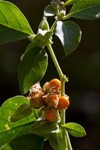| Scientific: | Withania somnifera |
|---|---|
| Other: | Ashwagandha |
| Family: | Solanaceae |
Ashwagandha is one of the most important herbs in traditional Ayurvedic medicine in India. It is sometimes called " Indian ginseng " because it acts primarily as an adaptogen to help mitigate the harmful effects of stress. Like many adaptogens, it affects hormones and is commonly used for low libido and infertility.
Unlike some adaptogens, ashwagandha has a sedative effect, and is often used for stressed individuals who are overexcited, nervous and having difficulties with sleep.
Used as an adaptogen in ayurvedic medicine; however, it is calming rather than stimulating.
Nervous
• overstimulated states
• insomnia
• anxiety
• nervous exhaustion
• poor cognition
• memory
• attention deficit hyperactivity disorder (ADHD, ADD)
• neurodegenerative disorders
• dementia
• Parkinson's disease
• Alzheimer's disease
• drug withdrawal
• smoking cessation
Cancer
• chemotherapy and radiation side-effects
• fatigue
• immunosuppresion (leukopenia, neutropenia)
Respiratory
• chronic respiratory conditions
• bronchitis
• asthma
Musculoskeletal
• myalgia
• rheumatic diseases and connective tissue disorders
• muscle weakness
• fibromylagia
• ostearthritis
• gout
Reproduction (male)
• sexual debility
• erectile dysfunction
• impotence
• infertility
Endocrine
• hypothyroidism
• chronic fatigue syndrome (CFS )
• Adaptogen
• Sedative
• Antiepileptic
• Nootropic
• Sexual Tonic
• Antiinflammatory
• Anticancer
• Immunomodulator
• Antispasmotic
• Neuroprotective
• Hepatoprotective
• Nephroprotective
• Antiaging
• Terpenoids
• Steroidal Glycosides (Withanolide)
• Alkaloids
• Tincture (1:5): 2 ml tid
• Liquid extract (1:2): 2-4 ml tid
• Decoction (dried herb): 3-6 g qd
Generally considered safe when used as indicated.
Caution: Hyperthyroidism; may stimulate thyroid function.
Barnes J, Anderson LA, Phillipson JD. Herbal Medicines, 3rd ed. London: Pharmaceutical Press, 2007.
Bone K. Principles and Practice of Phytotherapy. Edinburgh: Churchill Livingstone, 2000.
Bone K. A Clinical Guide to Blending Liquid Herbs: Herbal Formulations for the Individual Patient. St Louis, MO: Churchill Livingstone, 2003.
Brinker F. The Toxicology of Botanical Medicines, 3rd ed. Sandy, Oregon: Eclectic Medical Publications, 2000.
Felter HW, Lloyd JU. King's American Dispensatory. 1898. http://www.ibiblio.org/herbmed/eclectic/kings/main.html. Accessed: August 19, 2006.
Hoffman D. Medical Herbalism. Rochester, Vermont: Healing Arts Press, 2003.
Weiss RF. Herbal Medicine. Beaconsfield, England: Beaconsfield Publishers Ltd, 1988.
Williamson EM, ed. Major Herbs of Ayurveda. Edinburgh: Churchill Livingstone, 2002
Disclaimer: This content is subject to change. The information is intended to inform and educate; it does not replace the medical evaluation, advice, diagnosis or treatment by a healthcare professional. www.nhpassist.com © 2014 NDAssist Inc. and/or its affiliates. All rights reserved.

|
Ashwagandha
SummaryAshwagandha is one of the most important herbs in traditional Ayurvedic medicine in India. It is sometimes called " Indian ginseng " because it acts primarily as an adaptogen to help mitigate the harmful effects of stress. Like many adaptogens, it affects hormones and is commonly used for low libido and infertility. IndicationsSign in requiredActionsSign in requiredConstituentsSign in requiredPosologySign in requiredSafetySign in requiredReferencesSign in required |
|---|